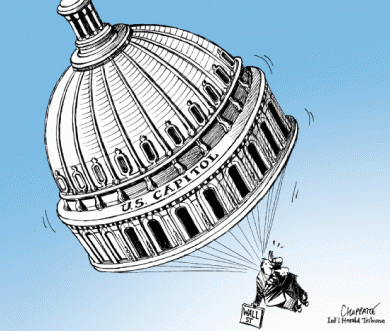Financial Times Deutschland, Germany
It's Not Greedy
Americans at Fault … It's the System
"It was perhaps not such a
great idea to introduce financial innovations, about which even professional
hedge fund managers declare themselves puzzled … the financial world would do
well to shift down a few gears and adjust their business practices to the
limited capacity of human beings to adapt."
By Thomas Fricke

Translated By James Jacobson and Ulf Behncke
September 27, 2008
Germany
- Financial Times Deutschland - Original Article (German)
Those who
really want to solve the financial crises should stop grumbling about greedy
people and excessive Americans. At the heart of the dramatic events unfolding
is a financial world that has been overwhelmed. This is rather a systemic
problem.

The, some would say, radical chairman of
the
German Left Party, Oskar Lafontaine.
Germany could do
without Oskar Lafontaine [the extremely-left wing chairman of the German Left Party,
who regularly calls for the nationalization a various German industries]. At
least as disturbed by the "rampant quest for profits" is the current Finance
Minister and tax expert, Peer Steinbrück. Meanwhile, European
politicians bad mouth bank managers or (indebted)
Americans, demanding that they themselves are held liable. "Brothers,
toward sunshine."
[Editor's Note:
Frick refers to the marching song Brothers, Toward Sunshine, Toward Freedom,
which was adopted by the German labor movement after World War II. Regarded as
a left-wing anthem, today it is the unofficial song of Germany's Social
Democrats, the SPD - which is the party of Chancellor Angela Merkel.]
Certainly, there
are greedy people who always want to obtain more money. The only question is
whether this is the problem at hand, and whether it explains
why the world of finance regularly faces increasingly dangerous crises which
have less to do with trade, let us say, than with the teeth of the cogs.
The problem may be less about greed, and more about the fact that bankers and
investors today are severely overwhelmed. This is, instead, a systemic problem.
Before the stock
market crash of 1987, there was a politically welcomed run on shares. Before
the Asia crisis of 1997-98, people believed it was great that one could reap
huge returns. Then it was the turn of Thailand. Then Argentina. Then came the New Economy: first boom and then bust. Now, it's
the subprime crisis and those panicked investment bankers.
Daily financial
transactions involving oil contracts operate on the same principle.
Economically, it hardly makes sense that prices in the
first half of the year shot up to $150 per barrel. Neither production nor
demand had changed so dramatically. The same applies to the foreign exchange markets.
Economically, one cannot justify the behavior of the yen. Nor can it be
explained why the euro has registered double-digit percentage gains: This is
due neither to the balance of trade - which is stable - nor the rapidly
increasing economic clout of, let us say, Italy. According to recent
assessments by Deutsche Bank, the euro is about a third higher than what one
would label as "economically fair."
As the great wave
of freedom for financial markets commenced in the 1970s, Milton Friedman  and the German Council of Economic Experts
and the German Council of Economic Experts  swore that market freedom would have a
stabilizing effect: should currency, stocks or real estate values move to
strongly in one direction, there would be market players who would anticipate the
movement and who would then speculate in the market, thereby reversing the
trend and thus preventing an "oversupply." In the end, all would be
well.
swore that market freedom would have a
stabilizing effect: should currency, stocks or real estate values move to
strongly in one direction, there would be market players who would anticipate the
movement and who would then speculate in the market, thereby reversing the
trend and thus preventing an "oversupply." In the end, all would be
well.

[International Herald Tribune, France]
Unfortunately this
was not the case. Far-sighted investors speculating about a fall failed to put
an early stop to America’s housing bubble. They also failed to prevent the
skyrocketing value of the euro, the run on the Asian markets in the 1990s or
the excesses of the NASDAQ [the dot.com bubble]. Even if central banks
contributed to soaring prices by providing cheap money from time to time and as
is regularly alleged, presumably rational investors (based on the above theory)
should have seen it coming - and should have known better than to get into the
game. U.S. homebuilders should have recognized the hype early on and stayed out
of it.
Posted by WORLDMEETS.US
All of this
raises the suspicion that even financial professionals are overwhelmed
(admittedly, a very well paid way to be overwhelmed). What the credit crisis
shows us is that the participants "don't understand what happened,"
says Belgian economist and financial analyst Paul de Grauwe.
The key problem with every bubble is precisely that no one knows when it's
prudent to put their money on a trend reversal, especially since this also
depends on how others react.
Behavioral
economists, through experiments, have found that traders follow simple rules -
good money, bad money - and if in doubt, follow the others. That’s how bubbles
are created.
People are being
overwhelmed, which is what Wolfsburg University economist Markus Spiwoks (1) discovered when he evaluated nearly
10,000 earnings forecasts by analysts of Morgan Stanley, Goldman Sachs, Lehman
Brothers and others between 1990 and 2006.* The extraordinary result: the
closer to the forecast period one got, the more inaccurate were the predictions.
On average, they were 76 percent too high or too low. Moreover, the
misjudgments of analysts converged - they appeared unanimously overwhelmed. Spiwocks' conclusion: such projections do little or nothing
to contribute to successful investment decisions."
Central banks
call this "procyclical behavior  ."
When prices increase, so does speculation about further increases. And as is
typical in the financial world, these activities are amplified due to virtual
transactions that can be realized in seconds. This applies less to car sales,
sales of widgets and much of the rest of capitalism. A turning point is reached
only when doubts spread among shareholders. Then things become intense and
there is a real risk of a "procyclical"
disaster. This somewhat describes what began with some unfortunate homebuilders
and Wall Street, which has just pushed the U.S. economy to the brink.
."
When prices increase, so does speculation about further increases. And as is
typical in the financial world, these activities are amplified due to virtual
transactions that can be realized in seconds. This applies less to car sales,
sales of widgets and much of the rest of capitalism. A turning point is reached
only when doubts spread among shareholders. Then things become intense and
there is a real risk of a "procyclical"
disaster. This somewhat describes what began with some unfortunate homebuilders
and Wall Street, which has just pushed the U.S. economy to the brink.
If the financial
markets were already often overwhelmed in terms of stabilization, it was
perhaps not such a great idea to introduce financial innovations, about which
even professional hedge fund managers declare themselves puzzled or even
mystified about how they function. According to studies by Carmen and Vincent
Reinhart, the frequency of financial exuberance on emerging markets rose as
financial markets were liberalized. And often, economic growth subsequently
diminished.
Posted by WORLDMEETS.US
Harvard economist
Dani Rodrik now doubts
whether financial liberalization has ever led to prosperity. Perhaps the
industry was above all, too preoccupied by its complicated products.
Unfortunately, the resulting crashes drag the rest of the economy down with
them.
Strong words
against unrestrained managers are of little help. It's about developing fairly
strict rules and countermeasures that could be employed to automatically
counter-steer, when once again, everyone heads in the same direction. And the
financial world would do well to shift down a few gears and adjust their
business practices to the limited capacity of human beings to adapt.
1) Deceptive
Unity: Surprising Characteristics of Pre-Tax Corporate Profit Forecasts, By
Markus Spiwoks, International Research Journal of
Finance and Economics (unpublished).
* Thomas
Fricke is Chief Economics Editor at the Financial Times Deutschland
CLICK
HERE FOR GERMAN VERSION
[Posted by WORLDMEETS.US
October 3, 1:19pm]